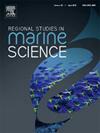Single-use plastic free islands: The case study of Donousa
IF 2.1
4区 环境科学与生态学
Q3 ECOLOGY
引用次数: 0
Abstract
This study investigates the impact of the four-year cleaning and awareness raising program implemented on Donousa, the first island in Greece to ban single-use plastics. Despite the relatively low marine macro-litter recorded levels, approximately 90 % of the collected items were composed of artificial polymer materials. According to the plastic’s Clean Coast Index analysis, the surveyed beaches transitioned from “very clean” or “clean” state in 2018 to a “moderate” state in 2021, mostly influenced by items transferred by sea currents, like plastic fragments ≥ 2.5 cm, which ranked as the primary litter type on Donousa. While most of the collected marine litter were of uncertain origin (55.7 %), land-based sources (2.5 %) found to be the least prominent, with fishing activity (16.8 %) and beach users (26.0 %) contributing significantly. Regarding the single-use plastic (SUP) items, that the program specifically targeted to reduce by transitioning to alternative options, their contribution to the total plastic marine litter load decreased by 11.2 % by the end of the program, with plastic bottles nearly eliminated. Notably, beach S4 recorded a 34.6 % reduction in SUPs. However, challenges persist with item categories such as caps/lids, cigarette butts and plastic bags, highlighting the urgency for more drastic preventive measures and coordinated interventions on a larger scale.
求助全文
约1分钟内获得全文
求助全文
来源期刊

Regional Studies in Marine Science
Agricultural and Biological Sciences-Ecology, Evolution, Behavior and Systematics
CiteScore
3.90
自引率
4.80%
发文量
336
审稿时长
69 days
期刊介绍:
REGIONAL STUDIES IN MARINE SCIENCE will publish scientifically sound papers on regional aspects of maritime and marine resources in estuaries, coastal zones, continental shelf, the seas and oceans.
 求助内容:
求助内容: 应助结果提醒方式:
应助结果提醒方式:


